All images by Stephanie Lee for RICE Media unless stated otherwise.
In ‘Singaporeans Abroad’, we share with you the stories of locals who—thanks to living in a globalised world—have found success in different corners of the globe, whether financially, romantically, or for the pure joy of adventure.
We recently heard from Bella Lee, a social work graduate who chose a job counselling orphans in Thailand for no pay. Then, there was Christian Ho, a Singaporean-Korean teenager living alone in the UK to chase his Formula One racing dream.
Now, we bring you Danelle Tan, a footballer who gave up a college scholarship to chase her sporting dreams in Dortmund, Germany.
I’ve been playing football for most of my life. But it was only in 2018, when I watched my very first live professional women’s match in Amsterdam, that it occurred to me: I could do this for a living.
It was a Vrouwen Eredivisie game—Netherlands’ top women’s football league, a top-of-the-table clash between Ajax and PSV. And as I was sitting in the stands alongside 5,000 other people, I felt inspired.
Football had never seemed like a real, tangible career path. I’d always loved football but I never thought I could actually make a living out of this sport.
Five years on, I’m still far off, but I would like to think I am a little closer to my professional football dreams. It still feels surreal to be able to say that I’m living in Germany, playing as a midfielder in Borussia Dortmund.
From Hobby To Dream
I grew up playing a whole multitude of sports. I have three siblings—two brothers and a younger sister—so there was always someone to play with. My parents were always encouraging us to play sports, too. The whole family would often play badminton together in the afternoons or swim together.
Growing up, I did ballet, I played chess competitively at Methodist Girl’s Primary School—I even represented Singapore in overseas tournaments. And I played football. I joined my brothers at JSSL FC, the only club then which had an all-girls team.
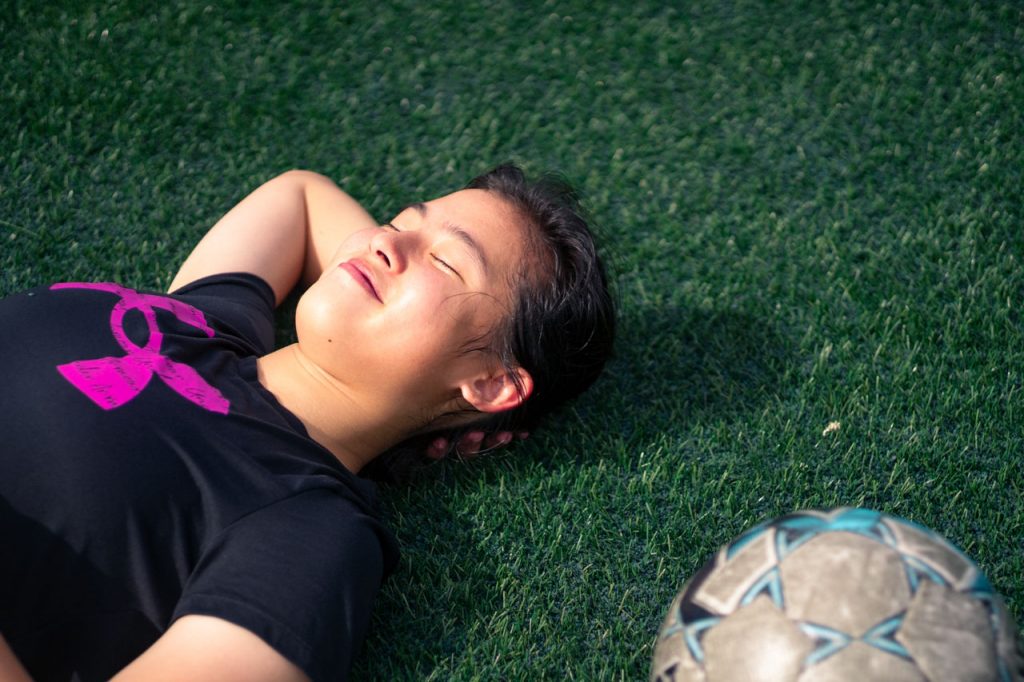
Football was always special to me. Maybe it was all the teammates who became friends. Or maybe it’s how every time I step on the field, everything else fades away, and all that matters is the ball and the game. I’m not sure exactly what it was, but my decision was easy when it became time to choose which sport I wanted to pursue.
At nine, I started playing in the JSSL leagues, competing against boys. At 13, I was the only girl in an all-boys team.
At the age of 14 years and 294 days, I made my debut with the senior national team. It was the 2019 AFF Women’s Championship in Thailand, and we were playing against Timor-Leste. A penalty was awarded in the 90th minute. I stepped up to the penalty spot—legs trembling after 90 minutes of running—and placed it into the bottom left corner of the goalpost.
Unfortunately, we ended up losing the game 1-2. That goal made me the youngest-ever international goalscorer (male or female) for Singapore.
School vs Football
I knew that if I wanted to pursue this dream of playing football professionally, I had to move overseas. The prospects to improve in Singapore simply weren’t there. There’s no professional women’s league in Singapore.
So it wasn’t so much a question of ‘if’, more a question of ‘when’.
In 2022, at the age of 17, I moved to the UK to study at Mill Hill School, taking a step that would hopefully put me closer to helping me achieve my dreams of turning professional. Being away from family—11,000 kilometres away and with an 8-hour time difference —was tough. That’s probably one of the biggest sacrifices I’ve had to make. But I’d say it’s worth it.
I’ve learnt so much. I was thrust out of my comfort zone and given sudden independence. All the people that I’ve met so far have been incredible. Living in a boarding school in London, I got to meet so many lovely people from all around the world —Iranians, Chinese, Italians. Two of my best friends were from India and Italy.
Your eyes are really opened when you meet and speak to people from different cultures with different perspectives and viewpoints.
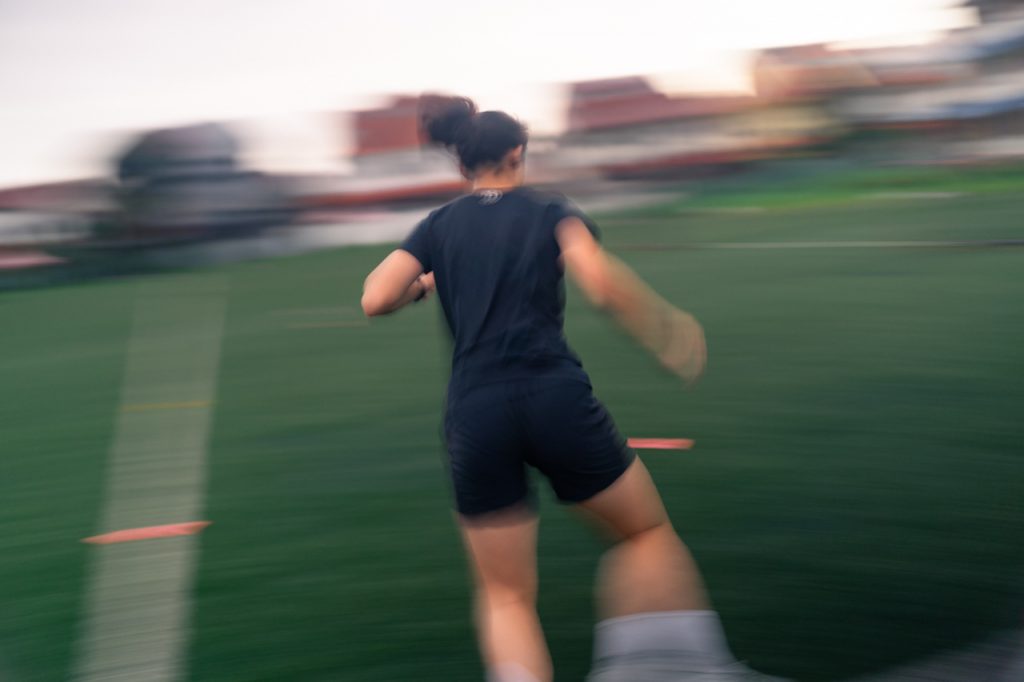
Football-wise, there was some culture shock, too. When I was in the UK playing for the London Bees FC, there was actually a bodybuilder on my team. I remember going up against her in one of my first few training sessions. She shoulder-bumped me—which isn’t a foul—and I flew off the pitch.
It made me realise that I had to improve my physicality. English players tend to be a bit more physical than Asian players, and if I wanted to compete, I had to hold my own. That was something that I really worked on in the gym, and it helped my performance even after I moved to Germany.
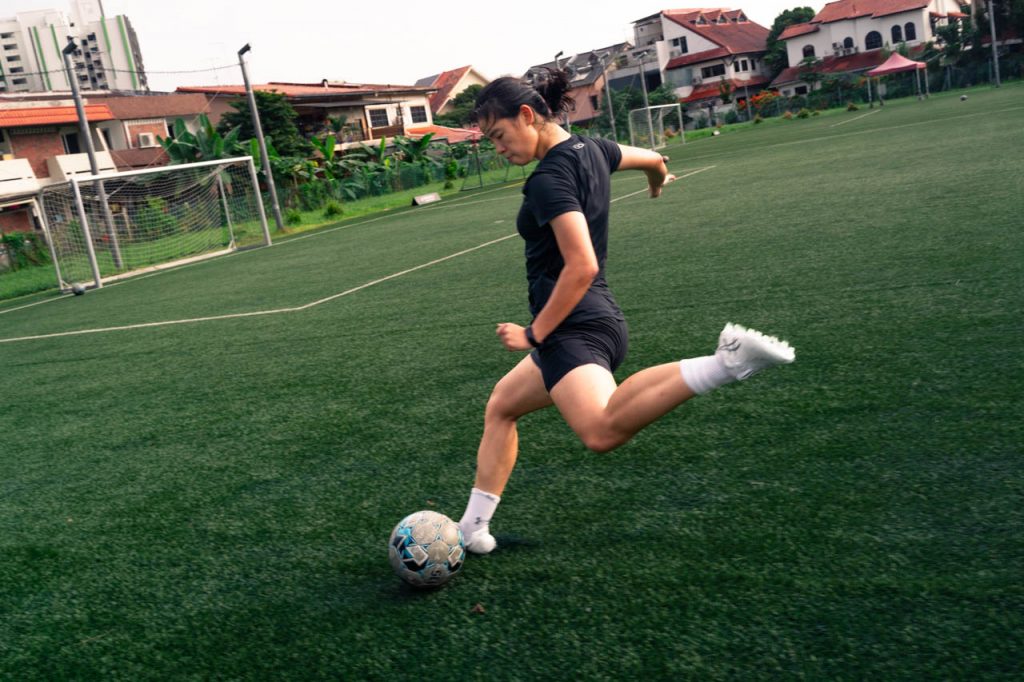
In November 2022, I was offered a scholarship by the College of William and Mary in the United States. I would have been the first Singaporean to be accepted into a National Collegiate Athletic Association Division I football programme.
It was very appealing to me because I would be able to attain a degree from a respected institution and compete in football at a high level. This made the decision to move to Dortmund all the more hard.
My parents and I had many conversations and discussions about it. At the end of the day, the conclusion was you can study at any age. Whether you want to or not, that’s a different question. But you can.
A footballer’s career lifespan, on the other hand, is short. You can only play football professionally till you’re around 35. So I really wanted to try and capitalise on the opportunities that I had right now.
While I was always juggling school and football before, this move to Germany meant I could finally focus more on football and training.
I still remember the moment when we were taking the official photos to announce my signing for Dortmund. I was dressed in Dortmund’s iconic yellow-and-black kit. It was such a special moment to also have my parents and elder brother with me. I’ve been so lucky to have their support at every step of the way.
When in Germany…
I’ve put my further education on hold for now, but I’m still learning German.
It’s just such a big part of everything. In training sessions, I wasn’t able to understand what the coaches were saying. In the changing room, I struggled to connect with my teammates because of the language barrier.
It was tough when I first arrived in Germany. The coach will usually gather the team in a big circle before training to brief us on the plan for training that day. When I first joined, I would have no idea what was happening. I’d just stare blankly at the floor.
Thankfully, my teammates have been incredibly helpful. I actually have an American teammate who can speak German, and she really helped translate and explain what to do. A lot of my teammates also tried to help me and see if I understood everything, even though they struggled with English themselves.
I’ve really enjoyed myself and made some really good friends in the team. They’ve really played a huge part in helping me get used to life in Germany.
Even without school, life is still pretty busy here in Dortmund. But I’m enjoying it. Dortmund is one of the top five most populated cities in Germany. With that said, it still feels quiet. You feel like you have your own space.
I have German language classes in the morning, so I have to take a train to Düsseldorf, a city about an hour away by train, every morning. I then spend 4.5 hours learning German before heading back to Dortmund.
When I come back from language school, I usually cook a meal and then go to the gym. Then I have training, which usually ends pretty late, around 9:15 PM. I cycle back home and repeat it all again the next day.
We don’t have weekends off either—we play every Sunday. So weekends are usually more hectic.
A Football-Crazy City
Borussia Dortmund is a very special club. Dortmund—the city, not the club—has a really special football culture as well. If you mention Dortmund to anyone, the first thing that comes to mind is the football club.
I often joke that it’s probably not possible to walk 100 metres in the city without seeing some sort of BVB paraphernalia. In restaurants, there are Dortmund flags up, and they have jerseys hung up on their walls. Dortmund stickers are everywhere in the city. On the weekends, when there are games, the streets are flooded with people in the club kit.
In contrast, the culture in Singapore isn’t quite so football crazy. Dortmund has a population of about 800,000. Each weekend, people fill up the 80,000-seater Signal Iduna Stadium to watch the games.
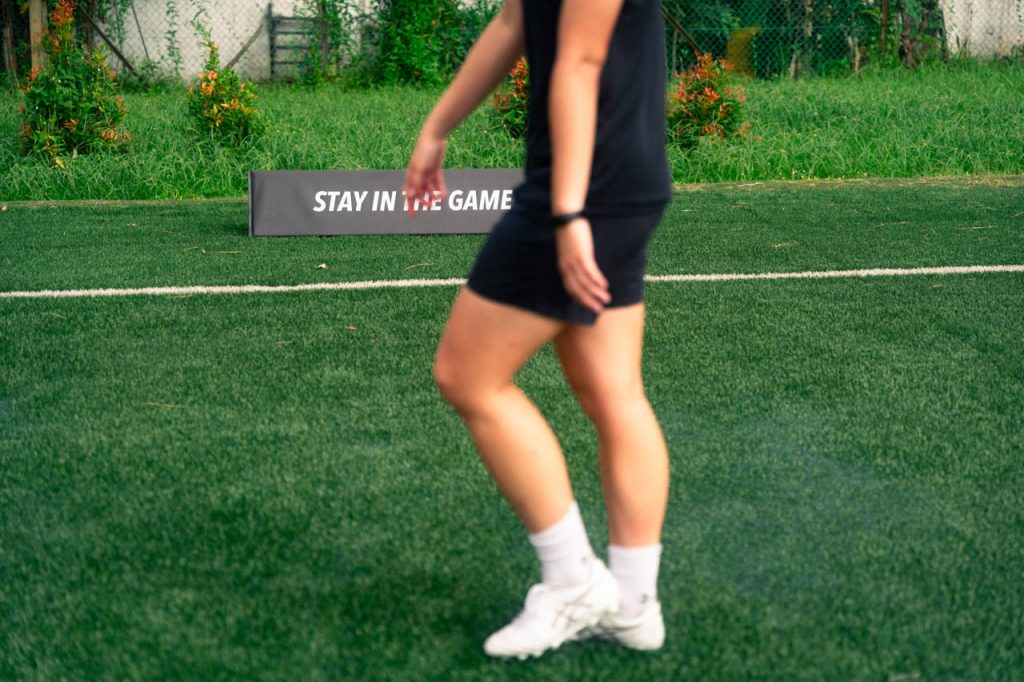
The Dortmund fans are incredible. They’re so supportive of the entire club, including the women’s team. I even had one fan give me a German children’s book to help me learn the language!
The last game I played with Dortmund before leaving Germany for the winter break was in -1°C weather. Icicles covered the field, and I couldn’t feel my toes at all. It was an ‘away’ game. The fans still turned up to support us and even set off fireworks to celebrate when we were through to the next round of the cup.
The Dortmund women’s team isn’t professional yet; we’re only two years old. The club only recently started to invest in the women’s side. Instead of buying an existing club, they wanted it to do it authentically and build it up from the bottom. That’s something I admire.
Here in Germany, the football league system is tiered, and the first two divisions are fully professional. The team started in the seventh tier, got promoted to the sixth in their first year, and is currently playing in the fifth tier.
Currently sitting at the top of the table in the 5th-tier Landesliga, we’re on track to being promoted to the 4th tier next year. I’ve scored 12 goals in 14 games so far and am glad to be contributing to the team’s success.
The dream is really to build and grow with the club. I hope to continue wearing the Dortmund black-and-yellow jersey when the club plays in the first Bundesliga.
Dortmund is a club with a rich history. I wish to write my own history in this club. No matter how small or big.
Singapore’s Still Home
I haven’t had the typical Singaporean coming-of-age story: Going to university, getting a degree, and finding a good job. But I’m lucky that my family has been supportive of my path. My dad has watched almost every single one of my games, even though many of my games in Germany are now played in the wee hours due to the time difference.
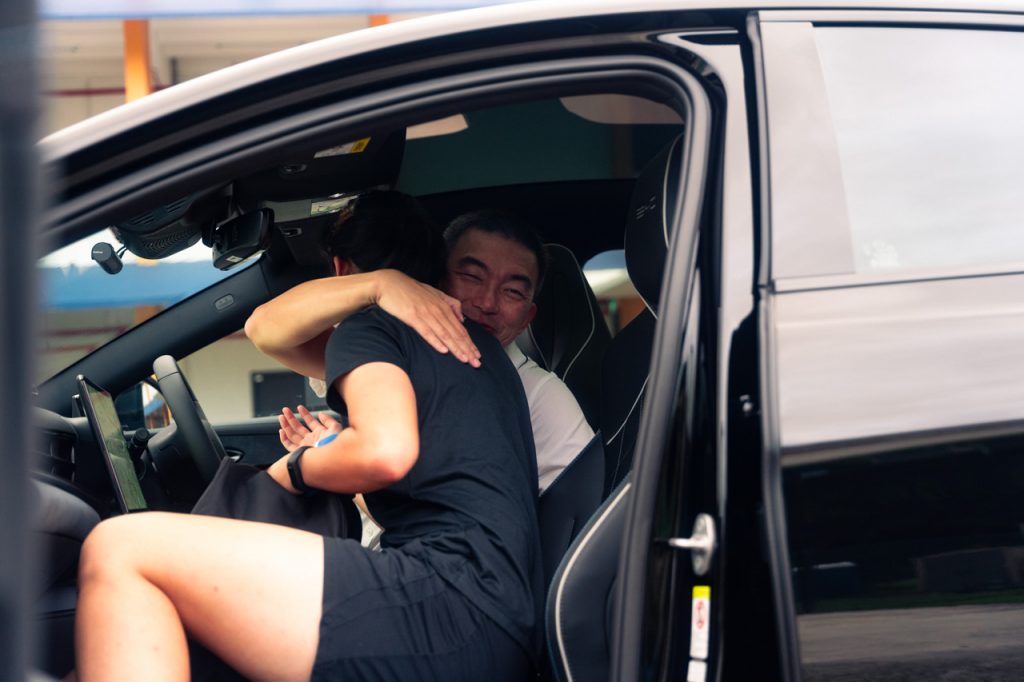
I’ve hit quite a few milestones, but I have to say that representing my country is still one of my proudest moments so far. Making my debut for the senior national team at the AFF Women’s Championship in 2019 was special—to be able to pull on a jersey with a flag on your chest and sing the national anthem before you start a game. I think that’s one of the biggest honours as a footballer or for any athlete, really.
I’m also an ambassador for women’s football in Singapore and had the honour of being mentioned in Minister for Culture, Community and Youth Edwin Tong’s speech at the Women’s Football Conference 2022. I don’t see it as pressure but more as a responsibility to be a good role model and raise awareness of my sport.
For the generations of young girls that will come after me, I hope to show them that you can do anything you want, no matter how unconventional, if you set your mind to it.






